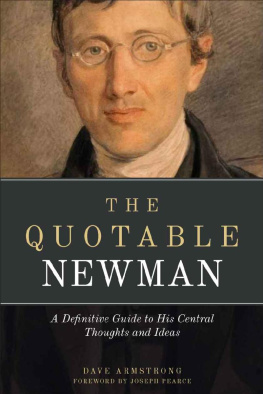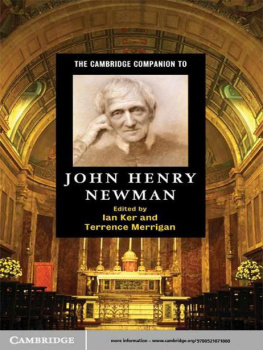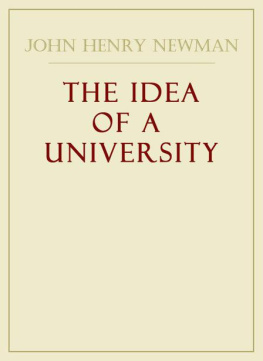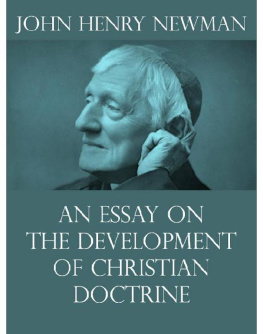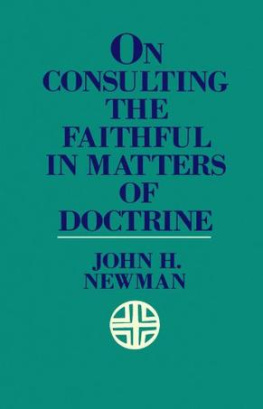APOLOGIA
PRO VITA SUA
By
John Henry (Cardinal) Newman
Introduction
No autobiography in the English language has been more read; to the nineteenth century it bears a relation not less characteristic than Boswells Johnson to the eighteenth.
Rev. Wm. Barry, D.D.
Newman was already a recognised spiritual leader of over thirty years standing, but not yet a Cardinal, when in 1864 he wrote the Apologia . He was London born, and he had, as many Londoners have had, a foreign strain in him. His father came of Dutch stock; his mother was a Fourdrinier, daughter of an old French Huguenot family settled in this country. The date of his birth, 21st of February 1801, relates him to many famous contemporaries, from Heine to Renan, from Carlyle to Pusey. Sent to school at Ealingan imaginative seven-year-old schoolboy, he was described even then as being fond of books and seriously minded. It is certain he was deeply read in the English Bible, thanks to his mothers care, before he began Latin and Greek. Another lifelong influenceas we may be prepared to find by a signal reference in the following autobiography, was Sir Walter Scott; and in a later page he speaks of reading in bed Waverley and Guy Mannering when they first came outin the early summer mornings, and of his delight in hearing The Lay of the Last Minstrel read aloud. Like Ruskin, another nineteenth-century master of English prose, he was finely affected by these two powerful inductors. They worked alike upon his piety and his imagination which was its true servant, and they helped to foster his seemingly instinctive style and his feeling for the English tongue.
In 1816 he went to Oxfordto Trinity Collegeand two years later gained a scholarship there. His fathers idea was that he should read for the bar, and he kept a few terms at Lincolns Inn; but in the end Oxford, which had, about the year of his birth, experienced a rebirth of ideas, thanks to the widening impulse of the French Revolution, held him, and Oriel Collegethe centre of the Noetics, as old Oxford called the Liberal set in contemptmade him a fellow. His association there with Pusey and Keble is a matter of history; and the Oxford Movement, in which the three worked together, was the direct result, according to Dean Church, of their searchings of heart and communing for seven years, from 1826 to 1833. A word might be said of Whately too, whose Logic Newman helped to beat into final form in these Oxford experiences. Not since the days of Colet and Erasmus had the University experienced such a shaking of the branches. However, there is no need to do more than allude to these intimately dealt with in the Apologia itself.
There, indeed, the stages of Newmans pilgrimage are related with a grace and sincerity of style that have hardly been equalled in English or in any northern tongue. It ranges from the simplest facts to the most complicated polemical issues and is always easily in accord with its changing theme. So much so, that the critics themselves have not known whether to admire more the spiritual logic of the literary art of the writer and self-confessor. We may take, as two instances of Newmans power, the delightful account in Part III. of his childhood and the first growth of his religious belief; and the remarkable opening to Part IV., where he uses the figure of the death-bed with that finer reality which is born of the creative communion of thought and word in a poets brain. Something of this power was felt, it is clear, in his sermons at Oxford. Dr. Barry describes the effect that Newman made at the time of his parting with the Anglican Church: Every sermon was an experience; made memorable by that still figure, and clear, low, penetrating voice, and the mental hush that fell upon his audience while he meditated, alone with the Alone, in words of awful austerity. His discourses were poems, but transcripts too from the soul, reasonings in a heavenly dialectic.
About his controversy with Charles Kingsley, the immediate cause of his Apologia , what new thing need be said? It is clear that Kingsley, who was the type of a class of mind then common enough in his Church, impulsive, prejudiced, not logical, gave himself away both by the mode and by the burden of his unfortunate attack. But we need not complain of it to-day, since it called out one of the noblest pieces of spiritual history the world possesses: one indeed which has the unique merit of making only the truth that is intrinsic and devout seem in the end to matter.
Midway in the forties, as the Apologia tells us, twenty years that is before it was written, Newman left Oxford and the Anglican Church for the Church in which he died. Later portraits make us realise him best in his robes as a Cardinal, as he may be seen in the National Portrait Gallery, or in the striking picture by Millais (now in the Duke of Norfolks collection). There is one delightful earlier portrait too, which shows him with a peculiarly radiant face, full of charm and serene expectancy; and with it we may associate these lines of hissincere expression of one who was in all his earthly and heavenly pilgrimage a truth-seeker, heart and soul:
When I would search the truths that in me burn, And mould them into rule and argument, A hundred reasoners cried,Hast thou to learn Those dreams are scatterd now, those fires are spent? And, did I mount to simpler thoughts, and try Some theme of peace, twas still the same reply. Perplexd, I hoped my heart was pure of guile, But judged me weak in wit, to disagree; But now, I see that men are mad awhile, Tis the old historyTruth without a home, Despised and slain, then rising from the tomb.
The following is a list of the chief works of Cardinal Newman:
The Arians of the Fourth Century, 1833; 29 Tracts to Tracts for the Times, 1834-1841; Lyra Apostolica, 1834; Elucidations of Dr. Hampdens Theological Statements, 1836; Parochial Sermons, 6 vols., 1837-1842; A Letter to the Rev. G. Faussett on Certain Points of Faith and Practice, 1838; Lectures on Justification, 1838; Sermons on Subjects of the Day, 1842; Plain Sermons, 1843; Sermons before the University of Oxford, 1843; The Cistercian Saints of England, 1844; An Essay on the Development of Christian Doctrine, 1845; Loss and Gain, 1848; Discourse addressed to Mixed Congregations, 1849; Lectures on Certain Difficulties Felt by Anglicans in Catholic Teaching, 1850; Lectures on the Present Position of Catholics in England, 1851; The Idea of a University, 1852; Callista, 1856; Mr. Kingsley and Dr. Newman, 1864; Apologia pro Vita Sua, 1864; The Dream of Gerontius, 1865; Letter to the Rev. E. B. Pusey on his Eirenicon, 1866; Verses on Various Occasions, 1868; An Essay in Aid of a Grammar of Assent, 1870; Letter addressed to His Grace the Duke of Norfolk on Occasion of Mr. Gladstones Expostulation, 1875; Meditations and Devotions, 1893.
Biographies.By W. Meynell, 1890; by Dr. Wm Barry, 1890; by R. H. Hutton, 1891; Letters and Correspondence of J. H. Newman, during his life in the English Church (with a brief autobiography), edited by Miss Anne Mozley, 1891; Anglican Career of Cardinal Newman, by Rd. E. A. Abbott, 1892; as a Musician, by E. Bellasis, 1892; by A. R. Waller and G. H. S. Burrow, 1901; an Appreciation, by Dr. A. Whyte, 1901; Addresses to Cardinal Newman, with his Replies, edited by Rev. W. P. Neville, 1905; by W. Ward (in Ten Personal Studies), 1908; Newmans Theology, by Charles Sarolea, 1908; The Authoritative Biography, by Wilfrid P. Ward (based on Cardinal Newmans private journals and correspondence), 1912.
Part I
Mr. Kingsleys Method of Disputation
I cannot be sorry to have forced Mr. Kingsley to bring out in fulness his charges against me. It is far better that he should discharge his thoughts upon me in my lifetime, than after I am dead. Under the circumstances I am happy in having the opportunity of reading the worst that can be said of me by a writer who has taken pains with his work and is well satisfied with it. I account it a gain to be surveyed from without by one who hates the principles which are nearest to my heart, has no personal knowledge of me to set right his misconceptions of my doctrine, and who has some motive or other to be as severe with me as he can possibly be.
Next page
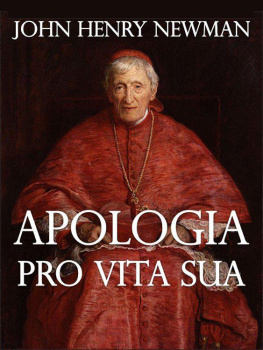
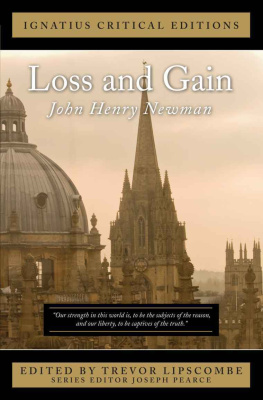
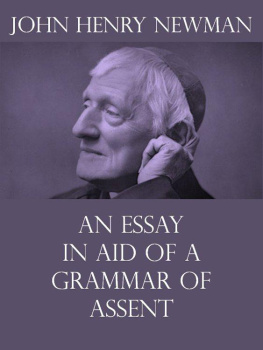
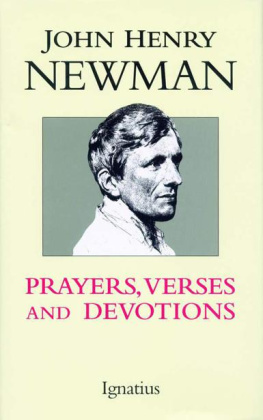
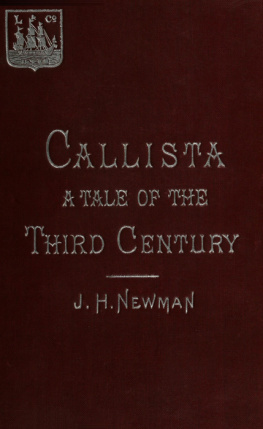
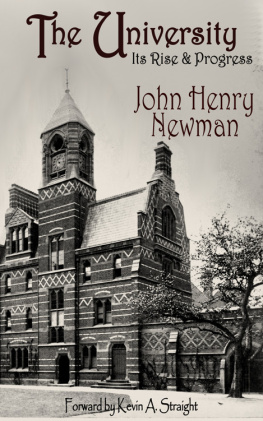
![Blessed John Henry Newman - Blessed John Henry Newman Collection [26 Books]](/uploads/posts/book/371011/thumbs/blessed-john-henry-newman-blessed-john-henry.jpg)

